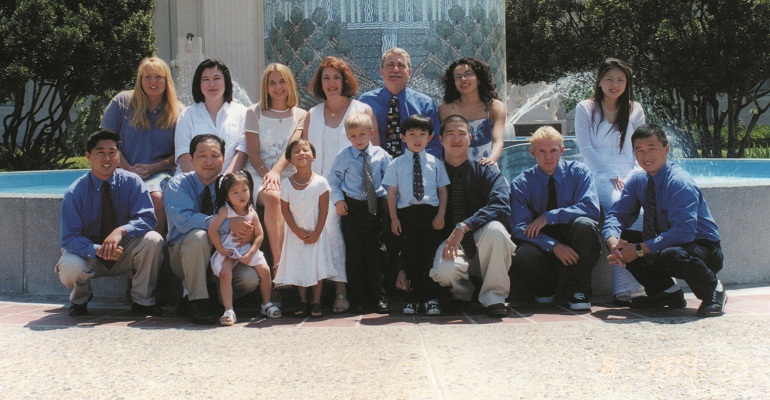My son, Ian, called late on a Saturday night to deliver his news: “Mom, I have a son, and he’s so beautiful! Now I know how much you and Dad have cared about us all these years.” If only I had had a crystal ball to predict that our years of love, occasional heartbreak, and unwavering commitment would yield those sweet words.
Back in 1979, Ian, eight years old and born in Korea, ran toward us down an airport runway, towing his four-year-old brother, Joshua. In time the duo allowed their younger brother—also Korean—to join the fun. After them came five more children, some through adoption, some through birth. Where did the years go after that?
A week after Ian’s call, I flew up the staircase to his apartment, and baby David was placed in my arms. I felt the same sense of love I had felt embracing his father all those years ago. I scrutinized this tiny stranger for clues that he was his father’s child. At first, I could not detect Ian’s features. Then he decided that he was hungry, scrunched up his face, filled his lungs for a lusty cry—and he was Ian all over again!
Meet the Grandparents
Ian’s wife, Eun Hwa, is Korean, and for the month before and after David was born, her mother came to visit. Her mother spoke as little English as I speak Korean. But she had no difficulty communicating what she wanted me to know: that she was the real Halmony (grandmother in Korean). She snatched the baby out of my arms at every opportunity, looking as though I might drop him. I knew I had to do something, but where was that instruction book—the one no one had written yet?
“Eun Hwa, please come sit with your mother and me. I want you to translate what I say to her.” She looked nervous. I began: “Please tell your mother that my husband and I are very grateful that she brought you up properly so that you know how to fulfill your obligations as the wife of our oldest son. We are pleased that you have presented us with a grandson—one who will carry our family name. Thank her for coming to help at this very special time. Please tell her that we invite her to visit with us anytime. Also tell her that our families are now joined.” Eun Hwa’s Oma smiled, then made eye contact with me for the first time. I had just communicated my knowledge of Korean culture—that her daughter, by marrying into our family, owed her allegiance to us. We are grandparents, and we really do count by her cultural standards.
After that, she couldn’t have been more considerate or willing to connect. We cooked together, sat side by side watching our grandson sleep, and even figured out how to assemble a stroller—after first putting the wheels on upside down. We laughed till we hurt.
On that same visit, we presented the new baby at Ian and Eun Hwa’s Korean church. As I walked in, someone gasped, and everyone turned to look. After the service, Ian bravely tried to introduce me to people he knew. Awkward doesn’t begin to describe it. I found my way to the pastor and took his arm. “Thank you for your kindness to Ian and Eun Hwa and, now, little David,” I started. “They need to be a part of this community, and I can’t imagine a nicer one for them. I noticed that you were surprised when I came in with Ian. I am guessing that you didn’t know he had been adopted by a white family. I hope that you can be glad that we were able to raise Ian to feel connected to the Korean-American community.” Then I added, “By the way, don’t you think baby David looks just like me?” When my joke registered, he laughed and laughed. Others came over, and pretty soon we were all chatting. The laughter and conversation led to questions I was happy to answer—about adoption and our family.
Once, at a restaurant, a waitress approached Ian, my Chinese-born daughter, Sierra Song E, and me, who happened to be standing apart from the rest of the family. The waitress took Ian aside and whispered (loudly), “Your sister looks OK—but your mom doesn’t look very Korean! Why not?” I flashed back to encounters we’d had when Ian and his brothers and sisters were children. Now the shoe was on the other foot; I was the one singled out as different. Her words stung. I wish now that I had had this experience years ago, to have understood even a little of what it must have felt like for my children.
The Conversation Continues
Not so long ago, we visited with another grandson, six-year-old Dae Won. “Halmony,” he asked, “why don’t you look like my mommy and daddy and me? Why didn’t you let my mommy stay with her other mommy?” (My daughter’s birth mother now lives in the U.S., and my grandson knows her.) After some consideration, I answered, “I don’t know for sure how your other Halmony made the decision that she couldn’t raise your mommy all the way to being a grown-up, so it would be a good idea for you to ask her about that. But after she decided that she couldn’t, Halabudgy and I decided that we could be your mommy’s other family. So now she has two families—really three, since she married your daddy and is part of his family, too.”
I was struck by the fact that Dae Won was so at ease asking such questions. He has none of the self-consciousness about hurting my husband and me that my children had as youngsters. It was refreshing, but it also brought a pang of sadness over the questions I suspect my own children stifled or only hinted at. These days, as a mostly adult family, we’re having some of the discussions we couldn’t or didn’t have when the kids were young. They’ve pointed out, for example, that my husband and I focused so strongly on our adopted children’s histories and cultural backgrounds that it created some resentment among their siblings. We were trying to strike a balance between our own heritage and theirs. If only we’d known. I’m realizing, once again, that I have to work at accepting myself as an imperfect but ever-evolving parent—and now grandparent—through adoption.
So, if anyone is teaching Grandparenting for Adoptive Parents 101, sign me up. The tasks ahead promise to be as challenging—and gratifying—as those we found in parenting.

